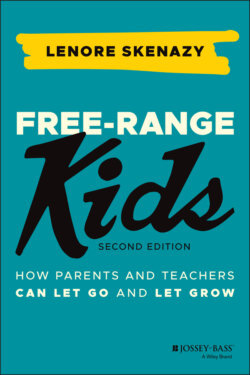Читать книгу Free-Range Kids - Lenore Skenazy - Страница 8
Introduction to the Introduction
ОглавлениеThis, my friends, is Edition 2 of Free-Range Kids, which first came out in 2009. Yes, that means that now my moppets are 20-ish and irrelevant and the other day, one of them actually mentioned hair loss. So let's talk about your moppets—still plenty hairy—and your role in raising or teaching them.
As a parent or educator, you are up against a culture obsessed with what I call “Worst-First Thinking”—thinking up the very worst-case scenario first, and proceeding as if it is likely to happen.
So the book you hold here will, I hope, help you to see-‘n-seethe. (Just like the See-'n-Say toy—but for an older crowd.) See how the culture is driving us nuts with worry, and seethe away. But then I hope you'll unwind a teeny bit, too.
This second edition should help. It's revised and updated, and while it skips Covid—because I really hope it'll be in the rearview mirror by the time you're reading this—it is plump with new chapters on tech, anxiety, the upside of downtime, and a chapter especially for educators. Consider it new and improved. “Now with extra sanity!”
Not that Edition 1 was such a slouch. That book inspired a reality TV show, “World's Worst Mom” (cancelled after one season, but still. Now it's on YouTube). “Free-Range Kids” made its way into textbooks, and onto The Simpsons. The book took me around the country, giving talks and meeting the Free-Range-curious. It inspired schools from New York to California to start promoting independence and free play as confidence/competence builders. And in 2018, Utah passed the country's first “Free-Range Parenting” law declaring it is not neglect to let your kids walk to school, play outside, etc. Imagine that. Now other states are drafting similar bills.
About three years ago, Free-Range Kids also inspired four activists concerned about childhood resilience—Daniel Shuchman, Peter Gray, Jonathan Haidt, and me—to found Let Grow, a non-profit promoting childhood independence.
Unfortunately, the phrase “Free-Range Kids” also inspired a bunch of annoyingly popular videos of people claiming they are “Free-Range Parents,” when actually they are never-weaning, no-bedtime, anti-sugar oddballs more afraid of a Pop-Tart than of letting their kids play in traffic.
At its worst, then, Free-Range Parenting has been mistaken—deliberately or not—for cavalier bordering on crazy. But at its best, “Free-Range” became a rallying cry for all of us eager to believe in our kids, our communities, and our own instincts again.
So enjoy Edition 2, and good luck to you and your kids. Tousle them while ye may.
